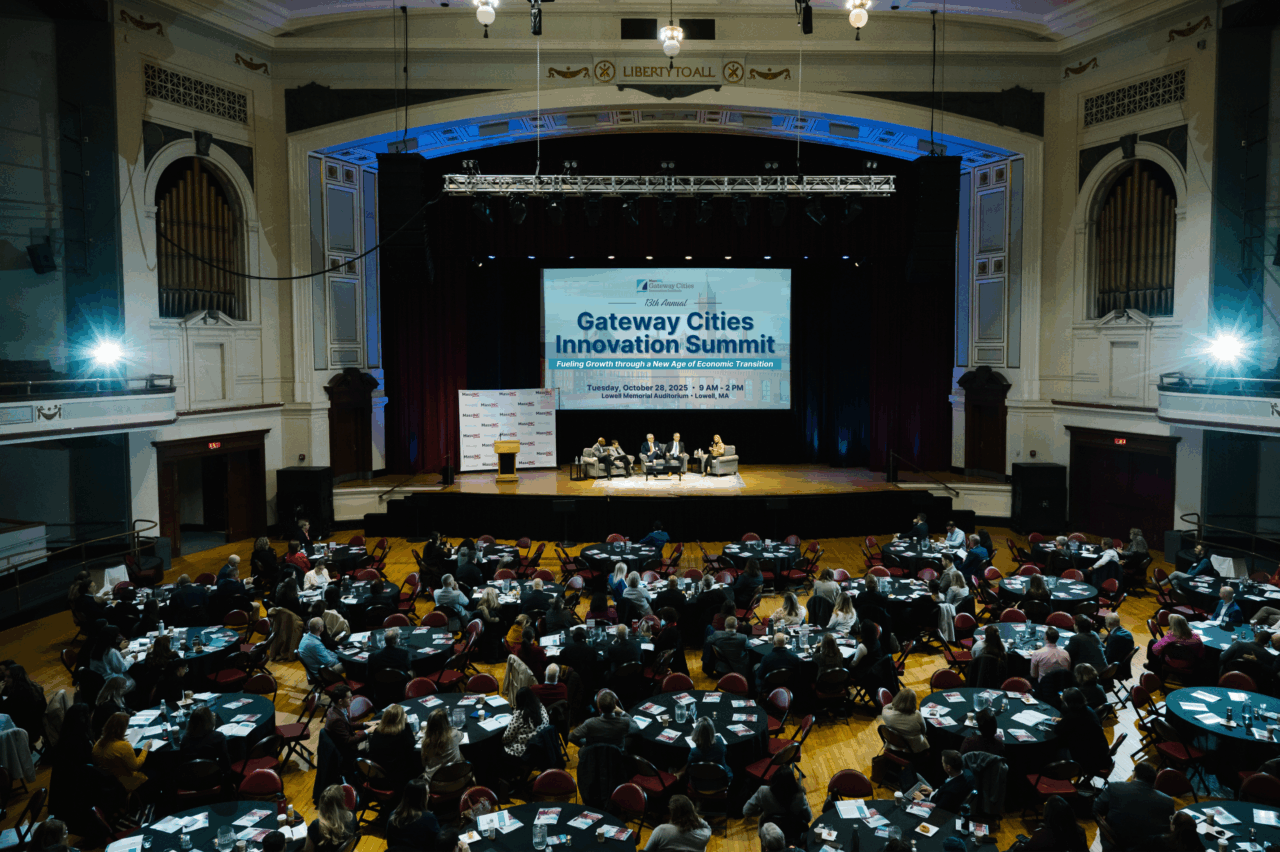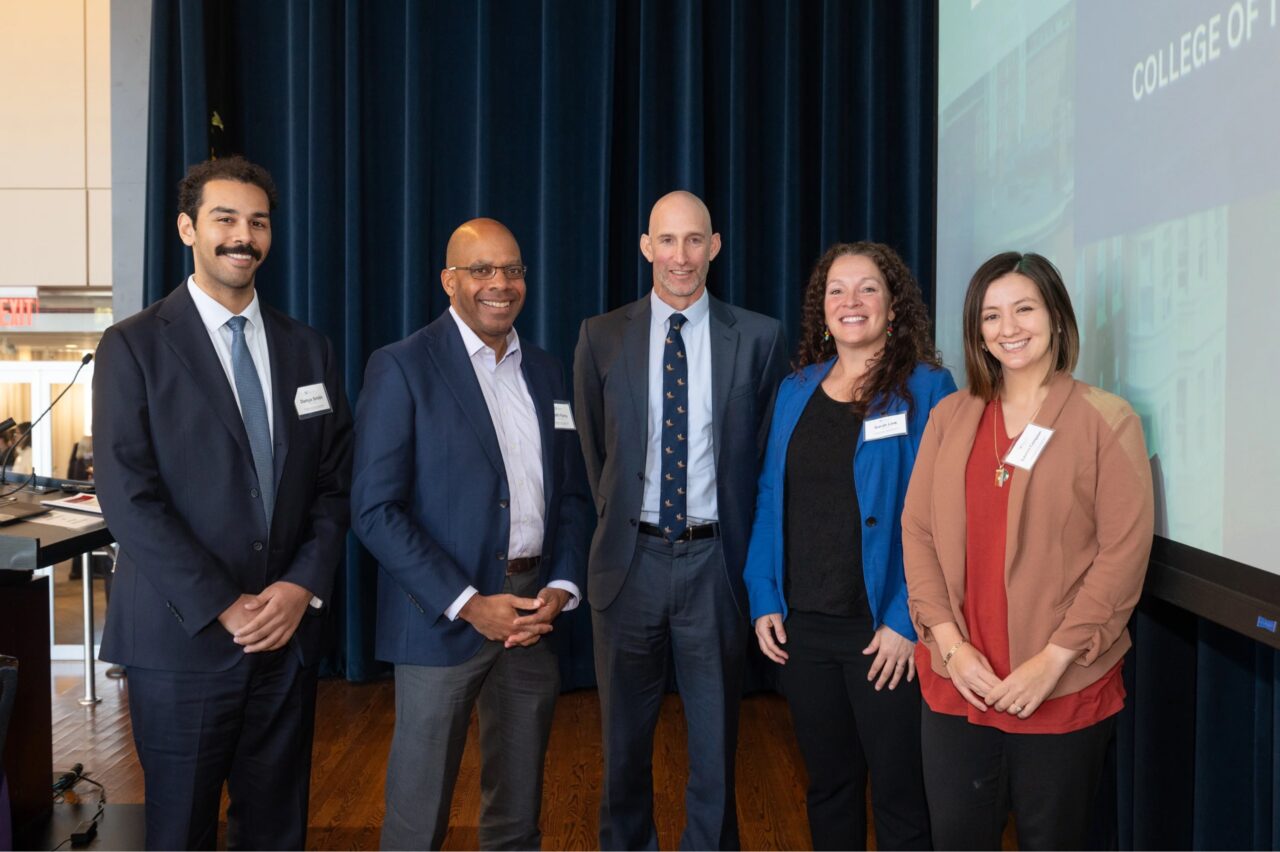On October 28, MassINC’s Gateway Cities Innovation Institute held its 13th Annual Gateway Cities Innovation Summit in Lowell, Massachusetts. The morning opened with welcoming remarks from Joe Kriesberg, CEO of MassINC, who set the stage for a day learning, inspiration, connection, and celebration. Mayor Daniel Rourke also welcomed attendees to Lowell, expressing his gratitude for bringing the Summit to a city that continues to redefine what innovation looks like in Massachusetts.
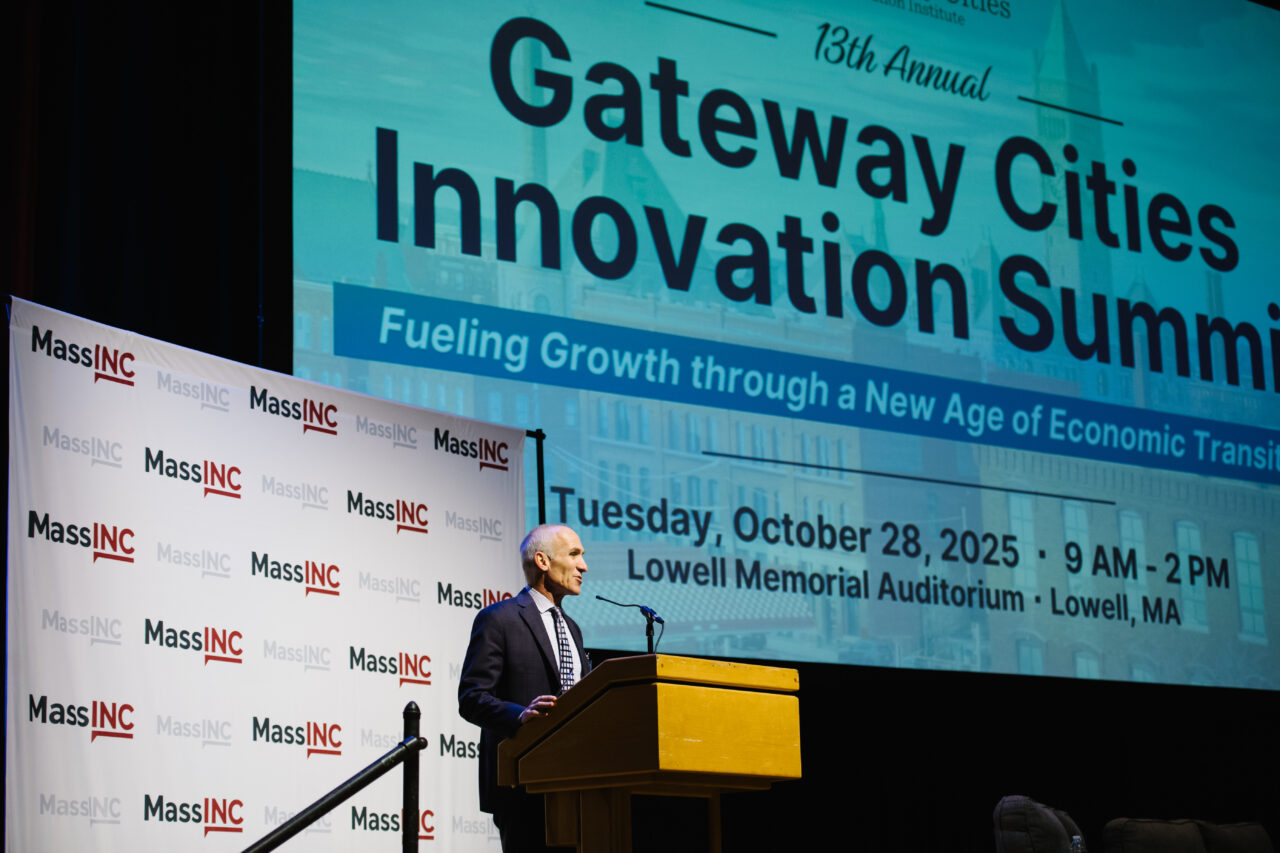
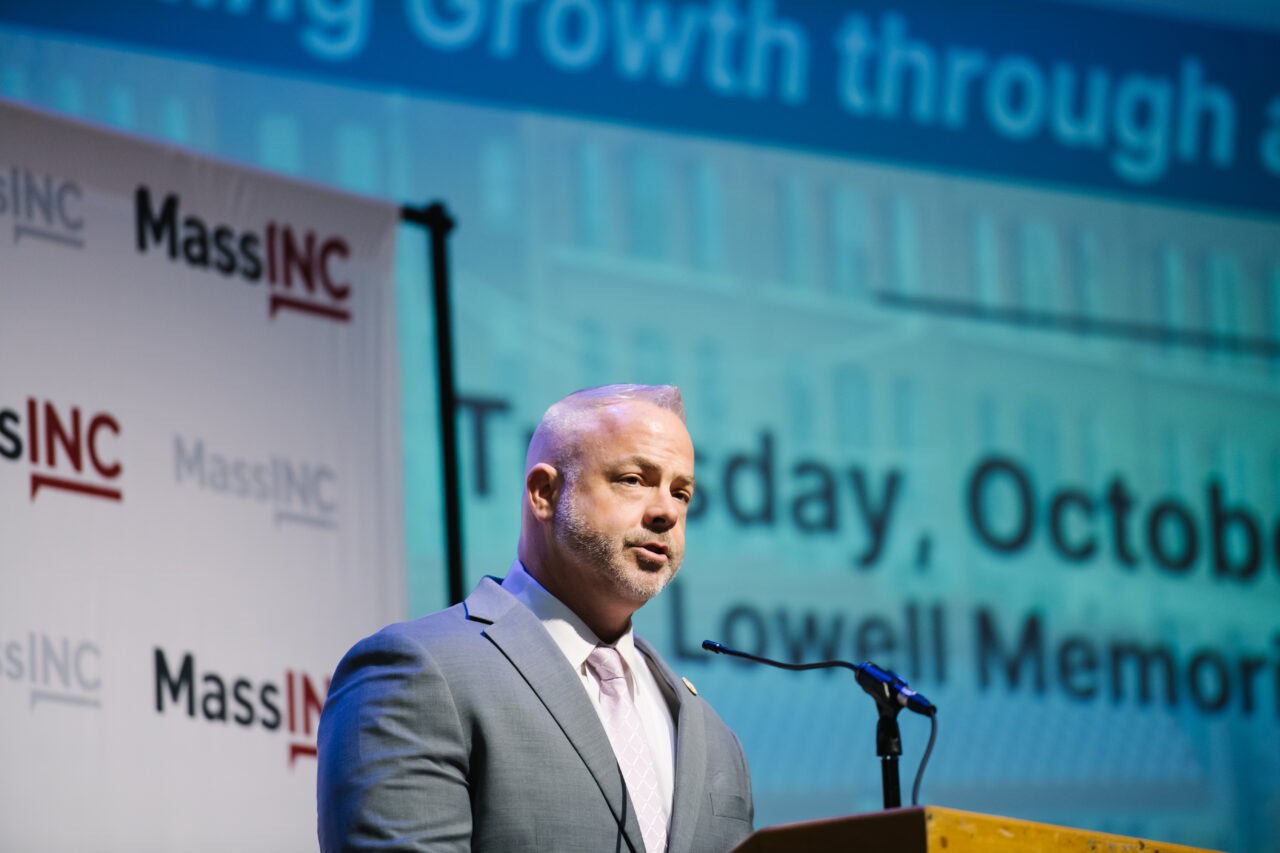
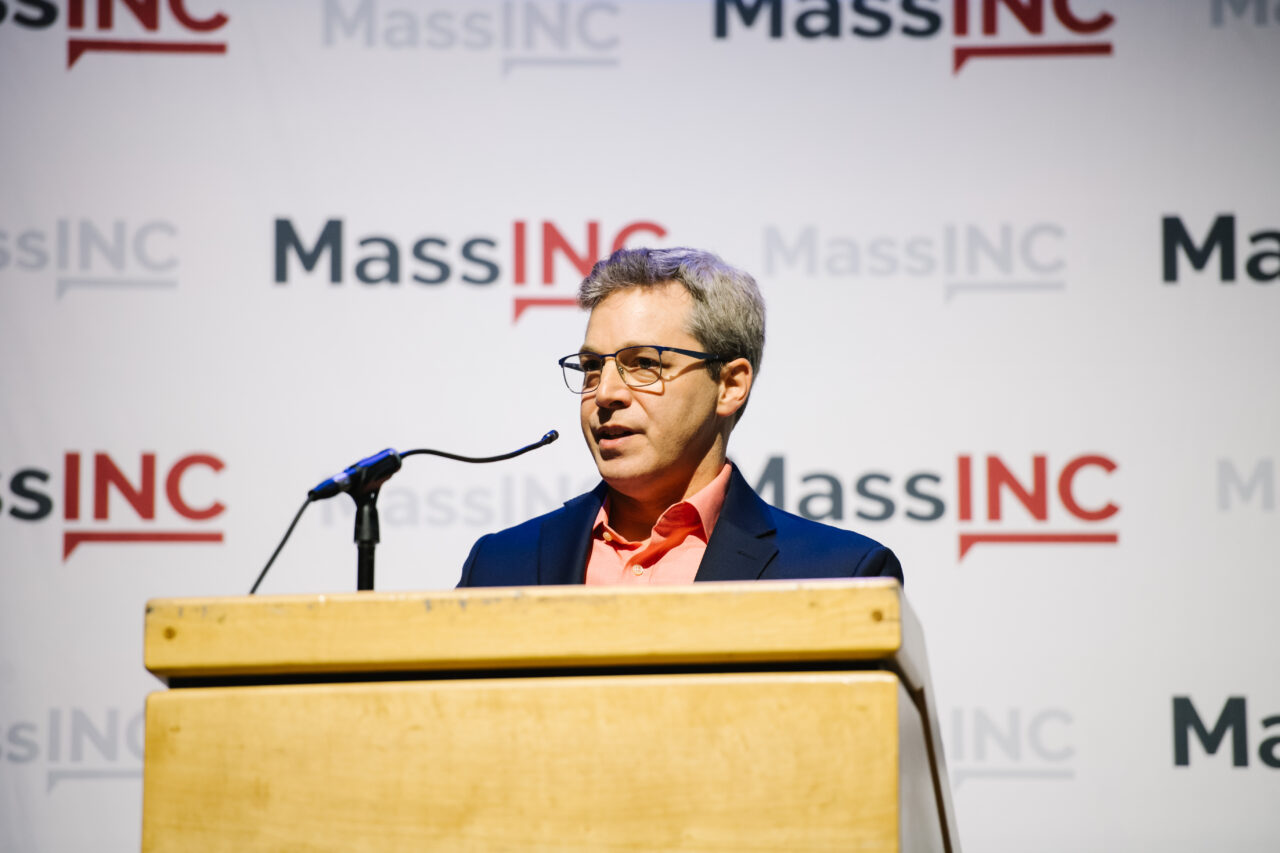
Innovation, he noted, is woven into Lowell’s DNA from its historic role as the birthplace of the American Industrial Revolution to its modern identity as a hub for advanced manufacturing, higher education, and entrepreneurship. Once a city that powered the nation through textile mills, Lowell now powers ideas—bridging its industrial legacy with a future built on technology, creativity, and community partnerships. With initiatives like the Lowell Innovation Corridor Network (LINC) and deep collaboration among its universities, businesses, and civic leaders, Lowell stands as a living example of how Gateway Cities can reinvent themselves for the 21st-century economy.
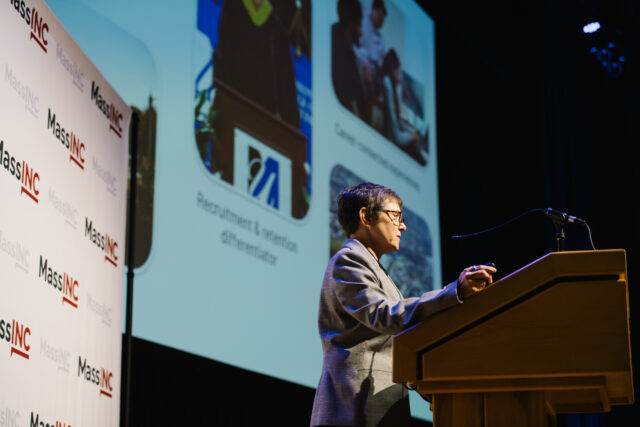
Anne Maglia, Ph.D., Vice Chancellor for Research and Development at UMass-Lowell, also presented a case study on the LINC, highlighting how the university is partnering with regional leaders to ensure students see a strong return on their educational investment. The initiative brings together state and federal officials, industry partners, and local community colleges to drive inclusive economic growth. Development within the corridor includes new mixed-use buildings with housing, business opportunities, and community spaces—all designed to activate downtown Lowell and help the city attract and retain talent.
Andre Leroux, Program Director of the Gateway Cities Innovation Institute, shared Five Big Economic Development Ideas designed to help Gateway Cities thrive amid economic uncertainty. His remarks emphasized the importance of aligning state and local strategies to unlock new sources of growth:
- “All Hands” for Housing Financing: Go big with the Housing Development Incentive Program (HDIP) and leverage new types of real estate financing to jolt housing production.
- A Flagship Downtown Program: Massachusetts needs an integrated downtown strategy with a clear, state-level vision and a consistent funding source.
- Level the Playing Field: Make it easier to develop in our cities than in our forests and farmland.
- Regional Innovation Campuses: When companies are ready to grow, we want them to stay in Massachusetts, and we want as many as possible to locate in Gateway Cities.
- Energy Abundance: Gateway Cities need access to ample, predictable sources of energy, and they need a greater ability to plan and allocate it.
Leadership for Economic Growth
During the morning plenary panel, local and state leaders painted a vivid picture of what real economic development looks like when partnerships take root. Moderated by Darnell Dunn, Director of Business Recruitment for the Worcester Regional Chamber of Commerce, the morning conversation brought together Lowell City Manager Tom Golden, UMass-Lowell Chancellor Anne Maglia, New Bedford Mayor Jon Mitchell, and Representative Carole Fiola, Chair of the Joint Committee on Economic Development and Emerging Technologies.
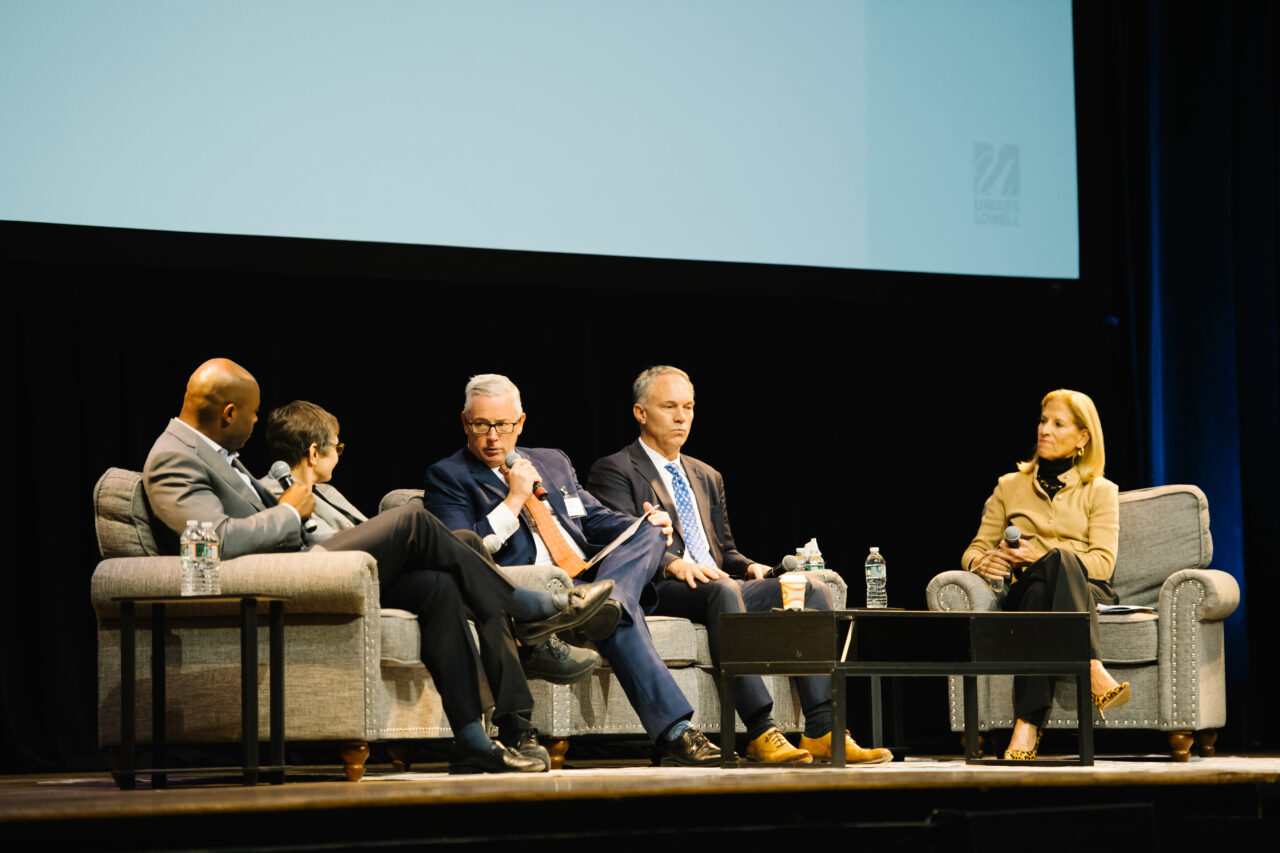
Their conversation moved beyond buzzwords to explore what it takes to create jobs, grow local economies, and ensure residents can build their futures in the places they call home. Lowell City Manager Tom Golden opened by acknowledging the buzz around the city’s LINC project—one of the Commonwealth’s most ambitious collaborations between higher education and municipal government. But for Golden, the real story is the cross sector relationships behind the development that make it possible.
From UMass-Lowell to Middlesex Community College, Lowell has woven a network of collaboration that’s driving progress in its Transformative Development Initiative (TDI) zone on Merrimack Street and sparking new housing opportunities in historically disinvested neighborhoods. “Getting to yes” has become the city’s mantra—focusing less on red tape and more on problem-solving, one block at a time.
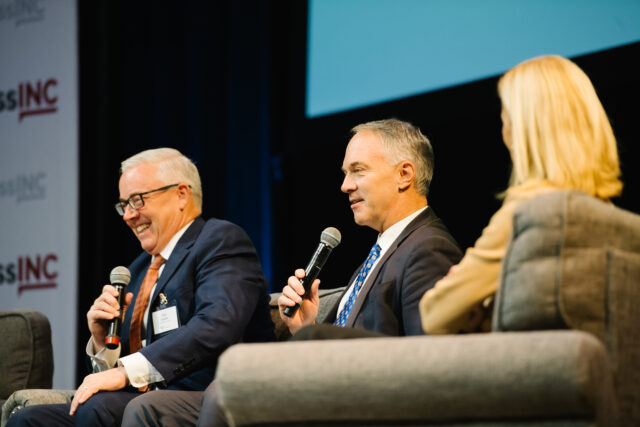
Down on the South Coast, Mayor Jon Mitchell brought a different perspective grounded in knowing your lane and playing to it. “We build on what we have,” he said plainly. For New Bedford, that means doubling down on its port—an economic engine that generates roughly 2% of the state’s GDP in just two miles of waterfront. From commercial fishing and seafood processing to the emerging offshore wind and marine technology industries, New Bedford is leaning into what makes it unique.
While housing affordability remains a challenge, Mitchell explained that it looks different than in Boston. In New Bedford, the issue is ensuring the city can meet growing demand at lower price points while preserving space for new industry. The city is also preparing to transform roughly 100 acres at its municipal golf course into an advanced manufacturing campus, a bold step toward long-term job creation and industrial growth.
Representative Carole Fiola brought the conversation home with a sweeping update on Fall River’s $400 million waterfront redevelopment—a project expected to leverage nearly $1 billion in new investment and create a new 22-acre neighborhood along the water’s edge. She credited coordinated advocacy by the Gateway Cities Innovation Institute for helping secure the Housing Development Incentive Program (HDIP), calling it one of the most transformative policies for cities like hers. “HDIP didn’t happen by accident,” Fiola noted. “It happened because Gateway Cities worked together and refused to let go.”
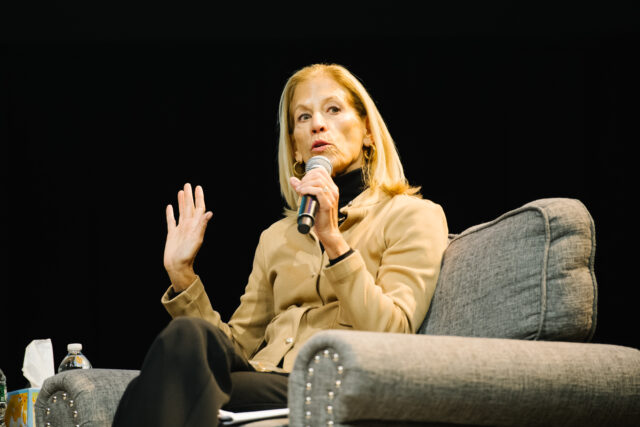
Fiola also urged leaders to keep their eyes on the workforce of tomorrow—especially as artificial intelligence, automation, and clean energy reshape industries. “We can’t build a strong economy if we’re not building the skills to match it,” she said. “That means deep collaboration between community colleges, employers, and policymakers.”
Across the conversation, one theme kept surfacing: progress takes time. Whether it’s transforming vacant lots in Lowell, redeveloping a port in New Bedford, or rebuilding Fall River’s waterfront, these projects often span decades. The leaders agreed that success comes from persistence—layering partnerships, policies, and shared vision until change sticks.
All pointed to education as the thread that ties it all together: from early college and technical training to free community college and lifelong learning. As Golden put it, “You can walk from pre-K to a doctorate in Lowell. That’s how you build opportunity.”
Breakout Sessions
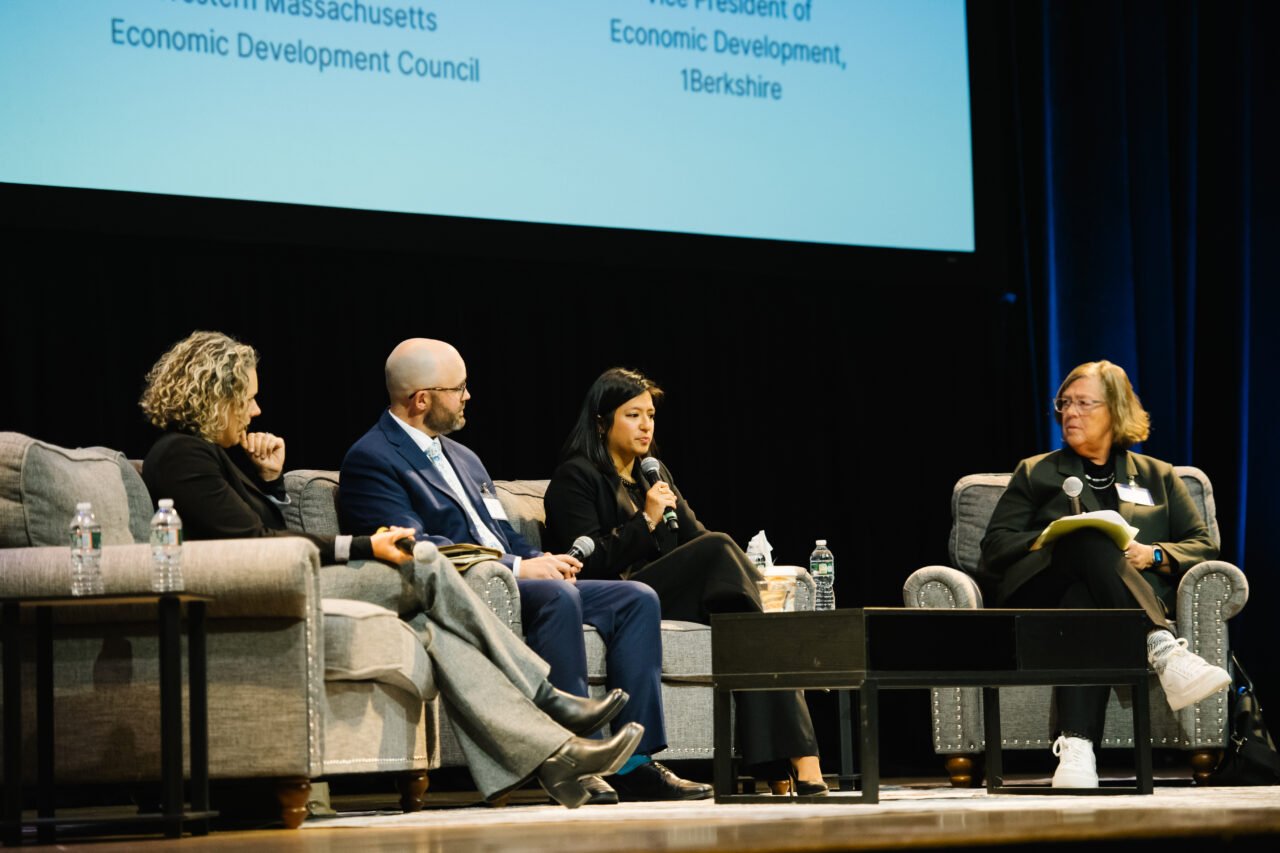
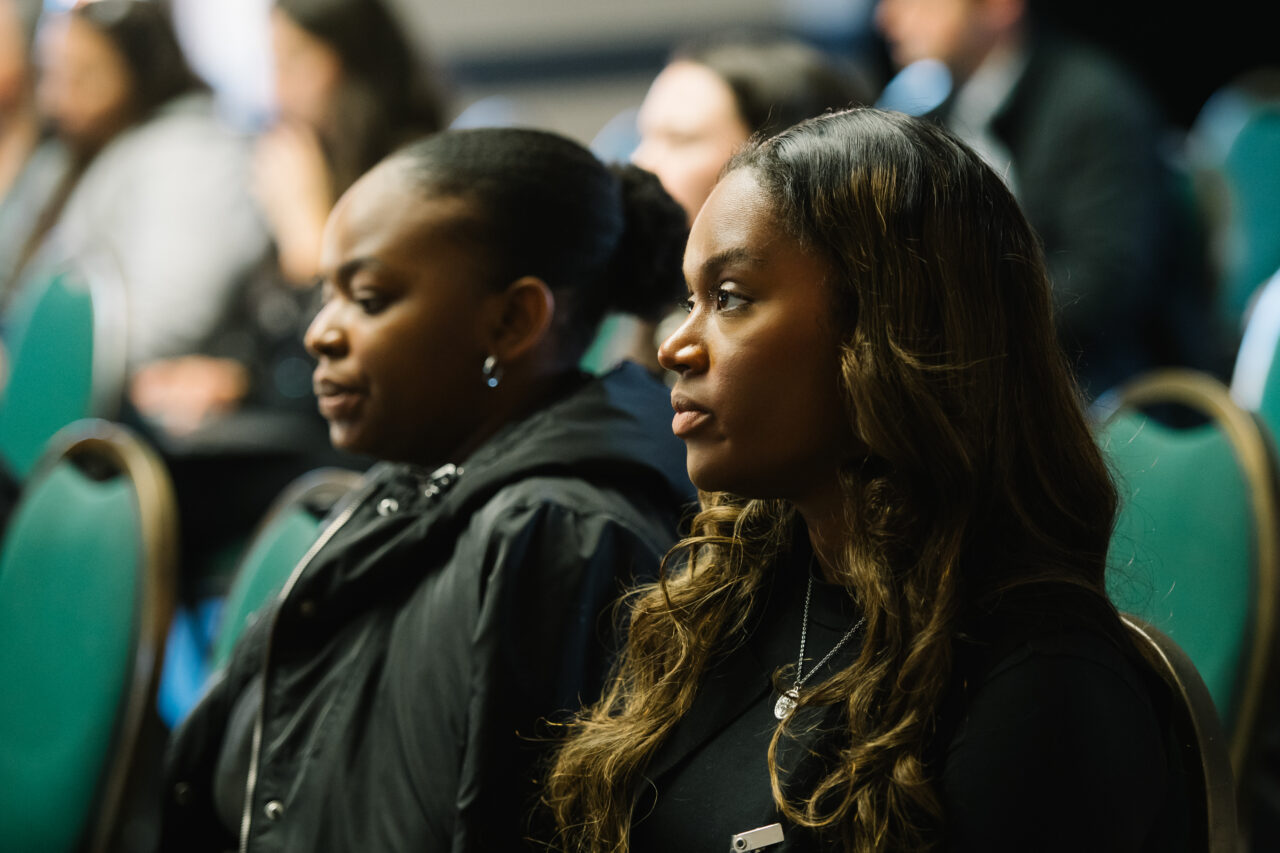
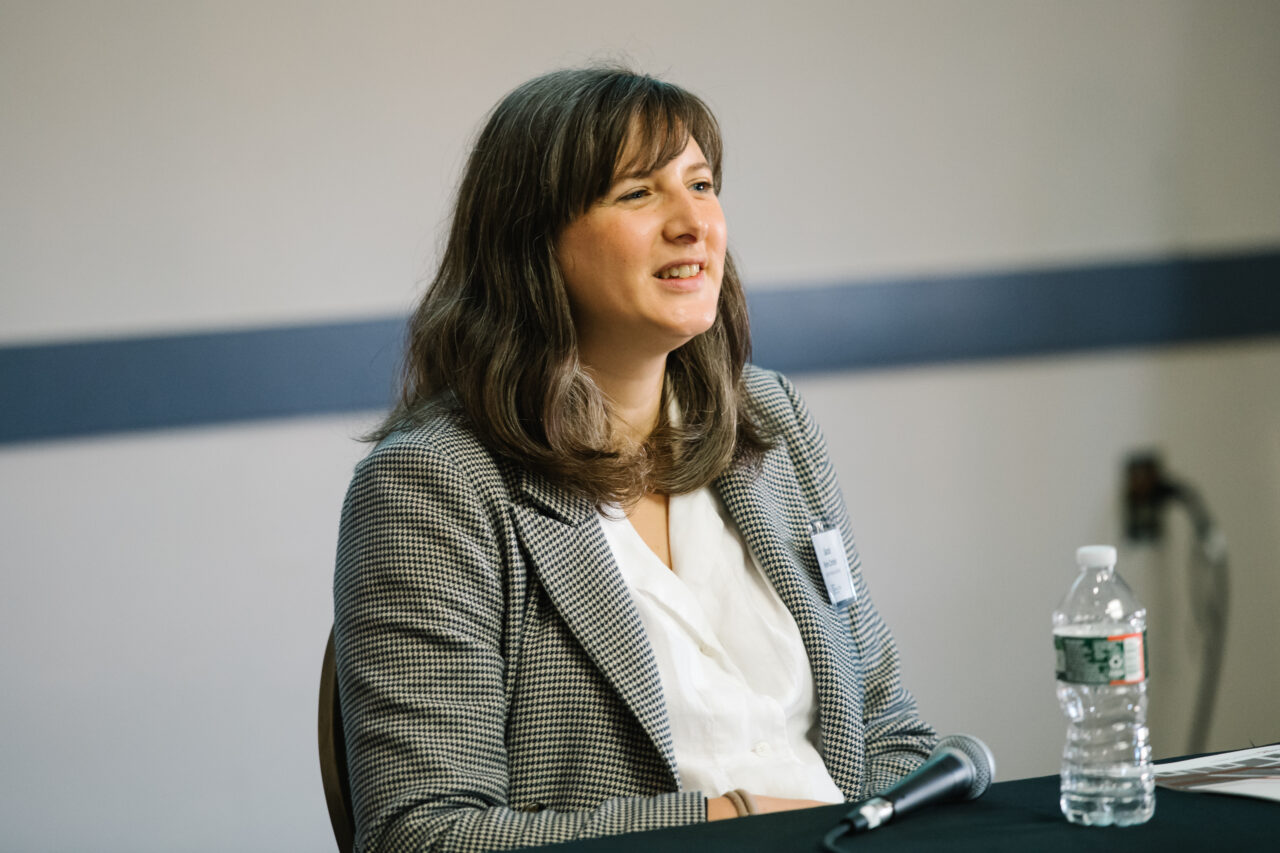
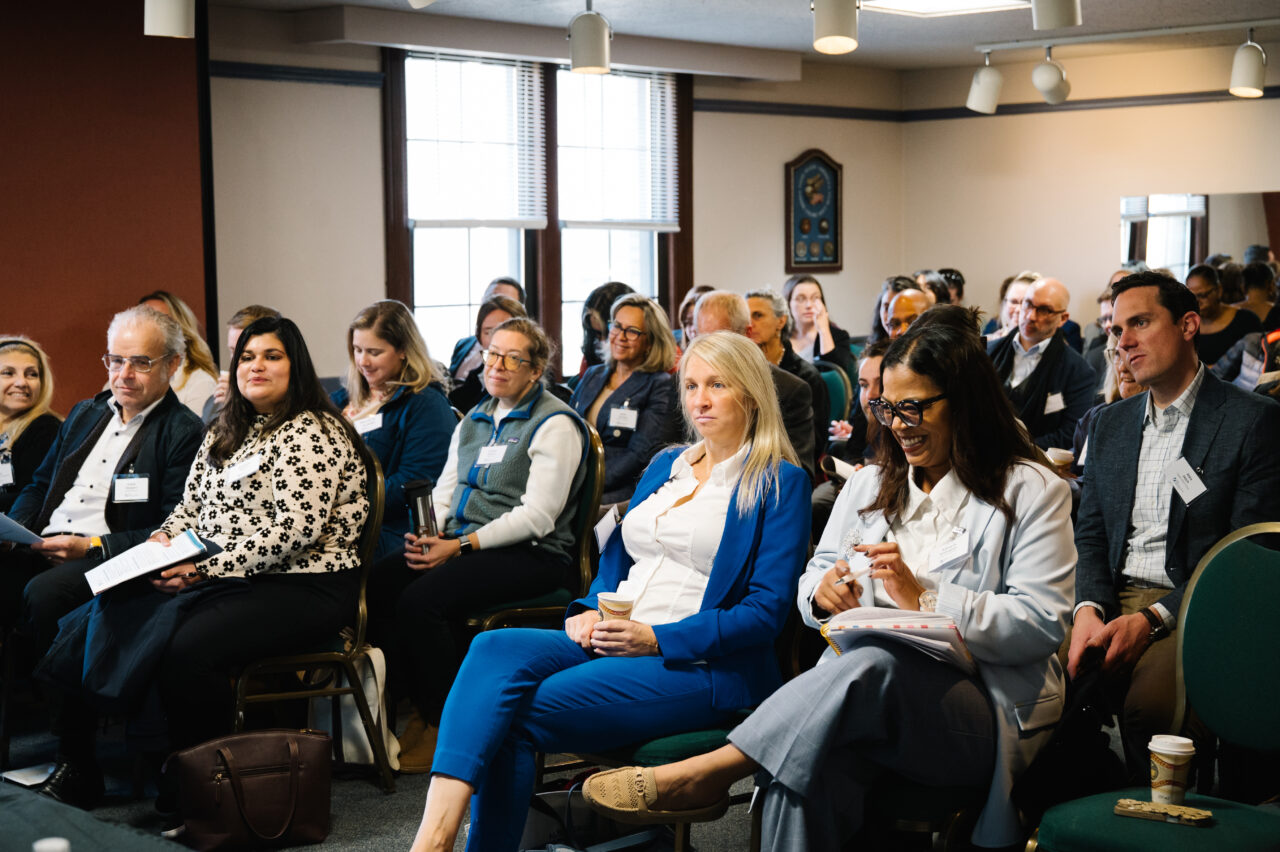
The breakout sessions gave attendees a closer look at the building blocks of Gateway City renewal—economic partnerships, housing opportunity, and the future of downtowns. Building Effective Economic Partnerships examined how collaboration between businesses, regional institutions, and local governments can help growing companies stay in Massachusetts. Panelists shared examples of how Gateway Cities are forming powerful public-private partnerships and nurturing regional industry clusters that create lasting jobs and strengthen local economies.
In Creating Homeownership Opportunities, speakers presented new findings from the 2025 Gateway Cities Housing Monitor, underscoring why expanding for-sale housing is essential to closing wealth gaps and building equitable communities. The discussion focused on overcoming financial, regulatory, and perception barriers that limit homeownership, while What’s Happening on Main Street? explored how local leaders are reimagining downtowns amid the pressures of online shopping, hybrid work, and rising costs. From creative small-business supports to placemaking strategies, participants highlighted how Massachusetts’ main streets can adapt—and thrive—in a changing economy.
Gateway City Innovation Awards
The 2025 Gateway Cities Innovation Awards celebrated outstanding leaders and initiatives advancing inclusive growth and community-driven progress across Massachusetts. This year’s honorees embody the ingenuity and perseverance that define the Gateway Cities movement by transforming local challenges into opportunities for lasting impact.
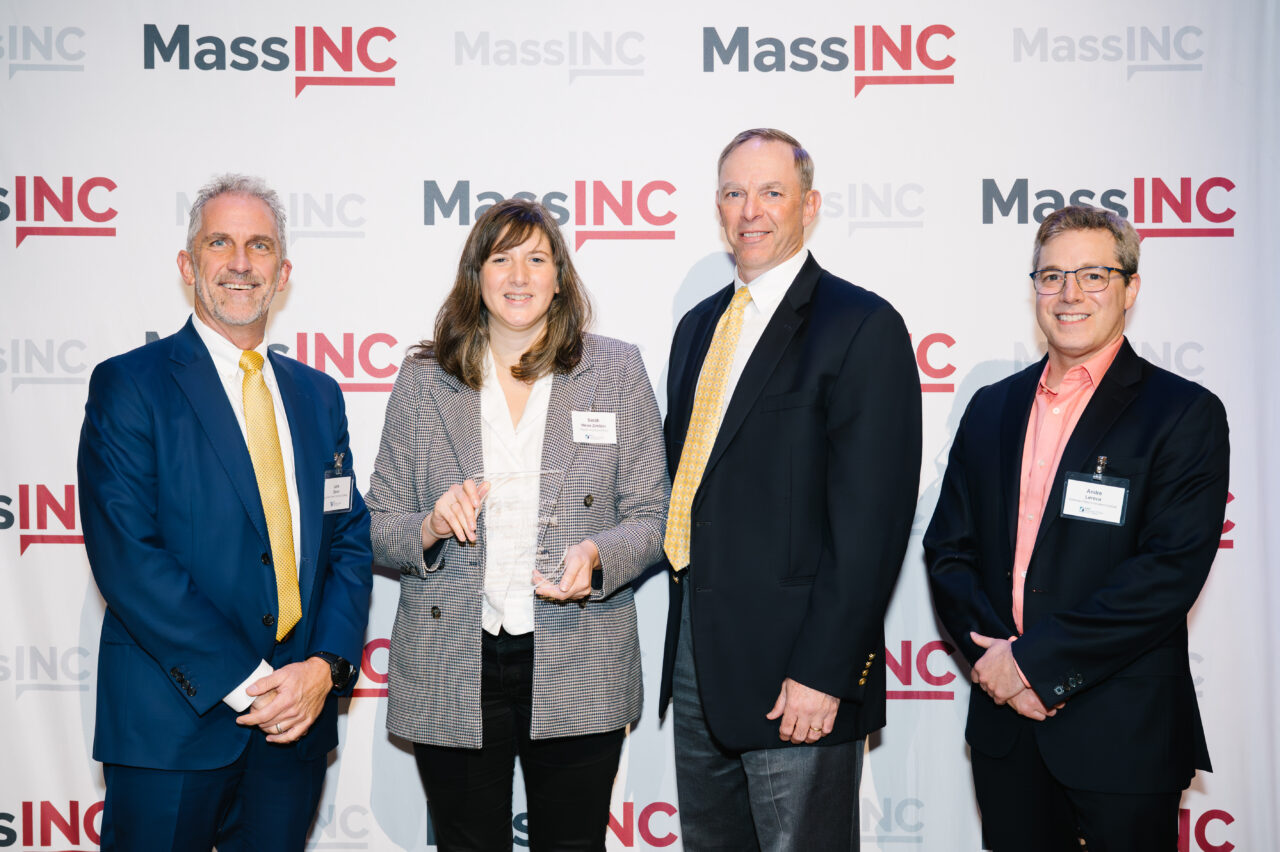
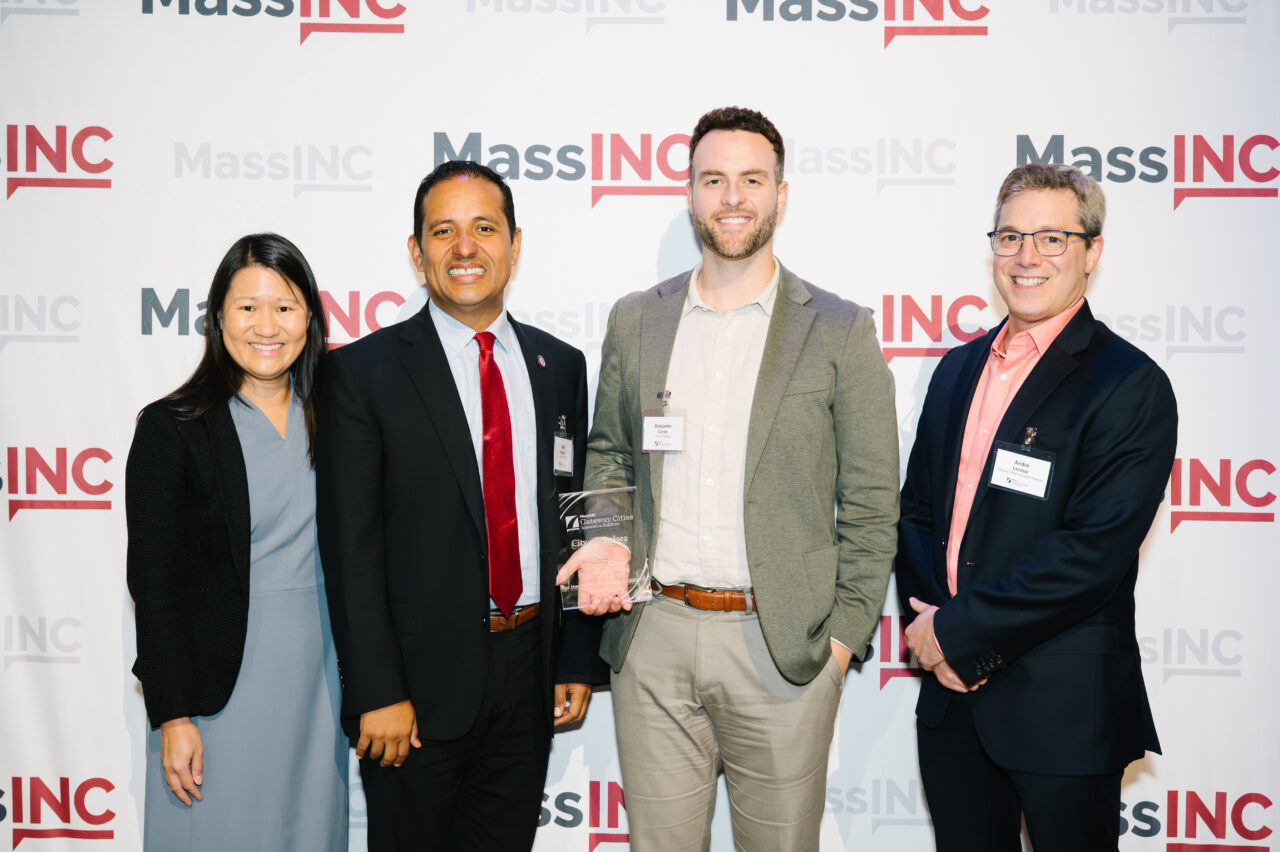
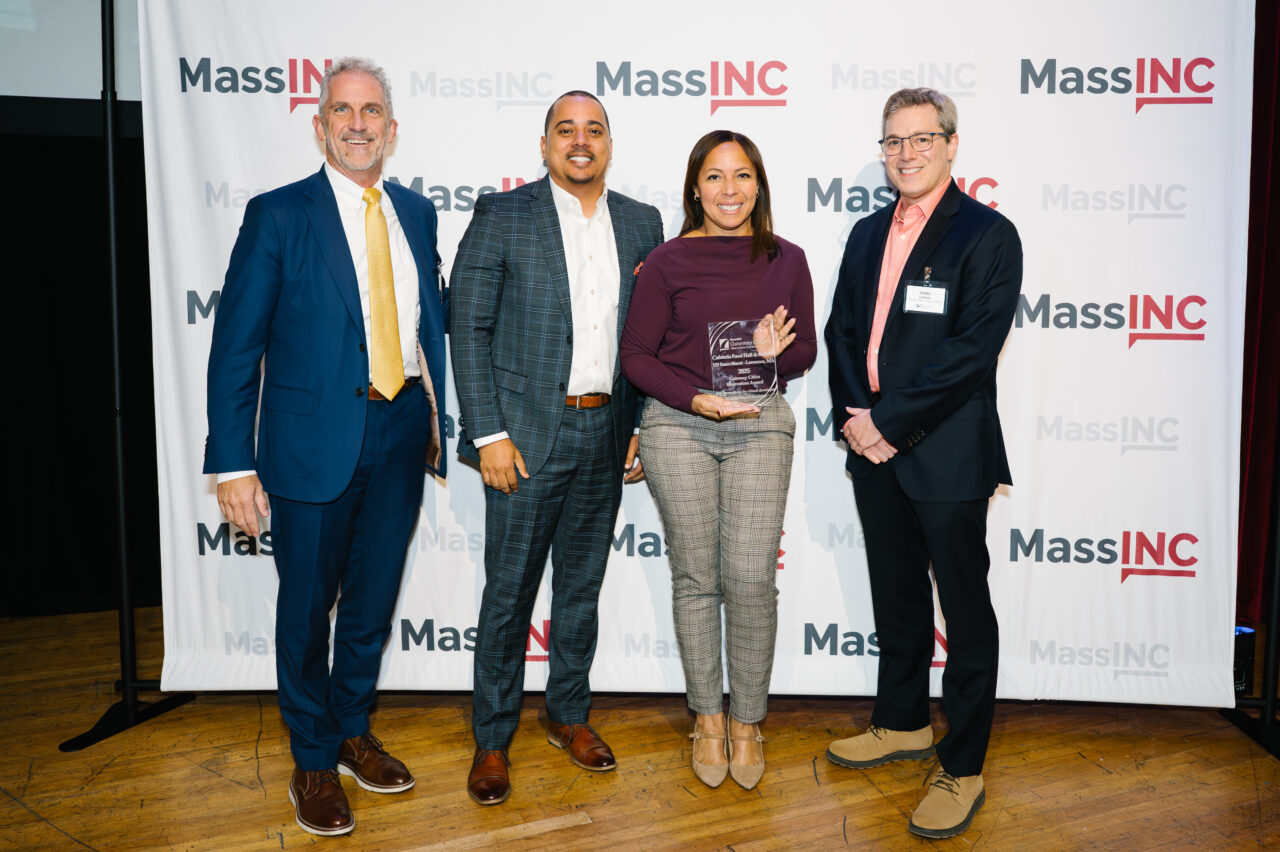
2025 Innovation Award honorees:
- Berkshire Blueprint 2.0, 1Berkshire (Berkshire County)
- CAFETERIA Food Hall & theJAV, Jowamar Companies (Lawrence)
- City of Chelsea (Chelsea)
- Holyoke Housing Authority (Holyoke)
- Massachusetts Biomedical Initiatives (Central Massachusetts)
- Shirley Ave TDI Partnership & SANA (Revere)
At this year’s Summit, the presentation of the Mayor Bill Carpenter Award and the Gateway Cities Champion Awards offered a powerful reminder that leadership takes many forms, but always starts with a commitment to people and place.
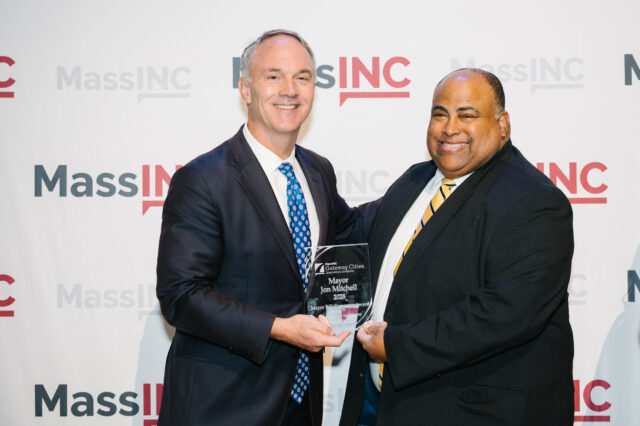
Mayor Jon Mitchell of New Bedford received the Mayor Bill Carpenter Award for his visionary, steady-handed leadership that has transformed his city into one of the Northeast’s most dynamic urban centers. Since 2011, he has guided New Bedford through a decade of progress—raising bond ratings, improving graduation rates, reducing crime, and breathing new life into long-neglected neighborhoods. Under his leadership, the city has sustained its position as the nation’s top commercial fishing port while expanding into offshore wind, marine technology, and arts-based economic development. Mitchell’s pragmatic optimism reflects the spirit of Bill Carpenter himself: leading with purpose, building coalitions, and proving that Gateway Cities can thrive through persistence and shared vision.
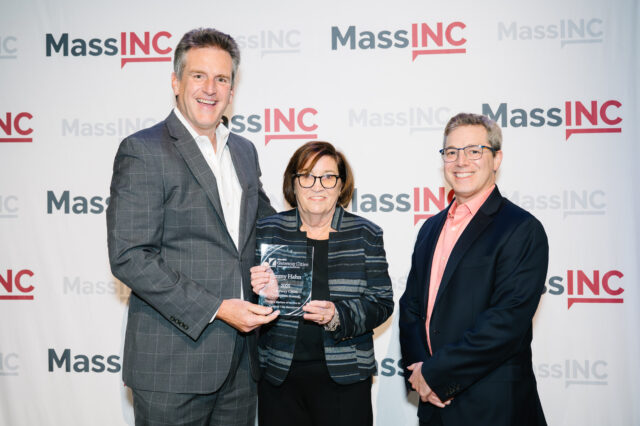
Emmy Hahn, recipient of a Gateway Cities Champion Award, has been the quiet architect behind downtown revitalization across Massachusetts for more than 25 years. As Program Coordinator for the Massachusetts Downtown Initiative, she helped communities reimagine their main streets through practical tools, workshops, and hands-on support. Her leadership during the pandemic—deploying the $10 million Rapid Recovery Plan Program for 124 cities and towns—cemented her legacy as one of the Commonwealth’s most trusted advisors on downtown resilience. Hahn’s career stands as a testament to her belief that strong local economies are built one storefront, one partnership, and one conversation at a time.
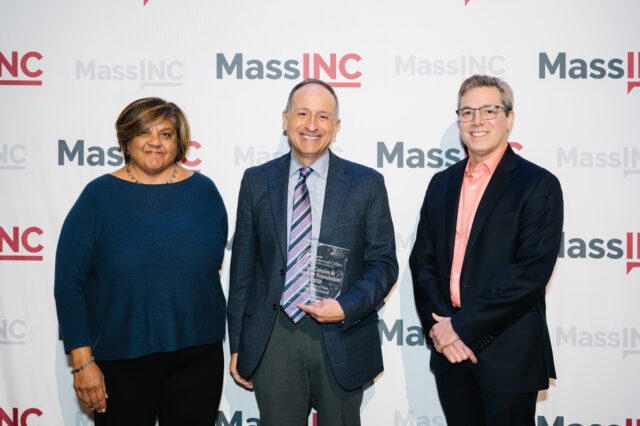
The second Gateway Cities Champion Award was awarded to Jim Canales and the Barr Foundation for reshaping the philanthropic landscape of Massachusetts. Under Canales’s guidance, Barr has become a model for inclusive, community-centered investment by funding local leadership, creative economies, and climate-resilient infrastructure that support the Commonwealth’s long-term vitality. Canales’s collaborative approach has strengthened the ecosystem that underpins Gateway City progress, from MassDevelopment’s Transformative Development Initiative to MassINC’s own research and advocacy. His leadership demonstrates how philanthropy, when guided by equity and trust, can be a catalyst for lasting, systemic change.
Together, these honorees embody the heart of the Gateway Cities movement—visionary leadership, deep collaboration, and a relentless belief in what is possible when communities come together to build their own future. Read more about our honorees here.
Fireside Chat with Secretary Eric Paley
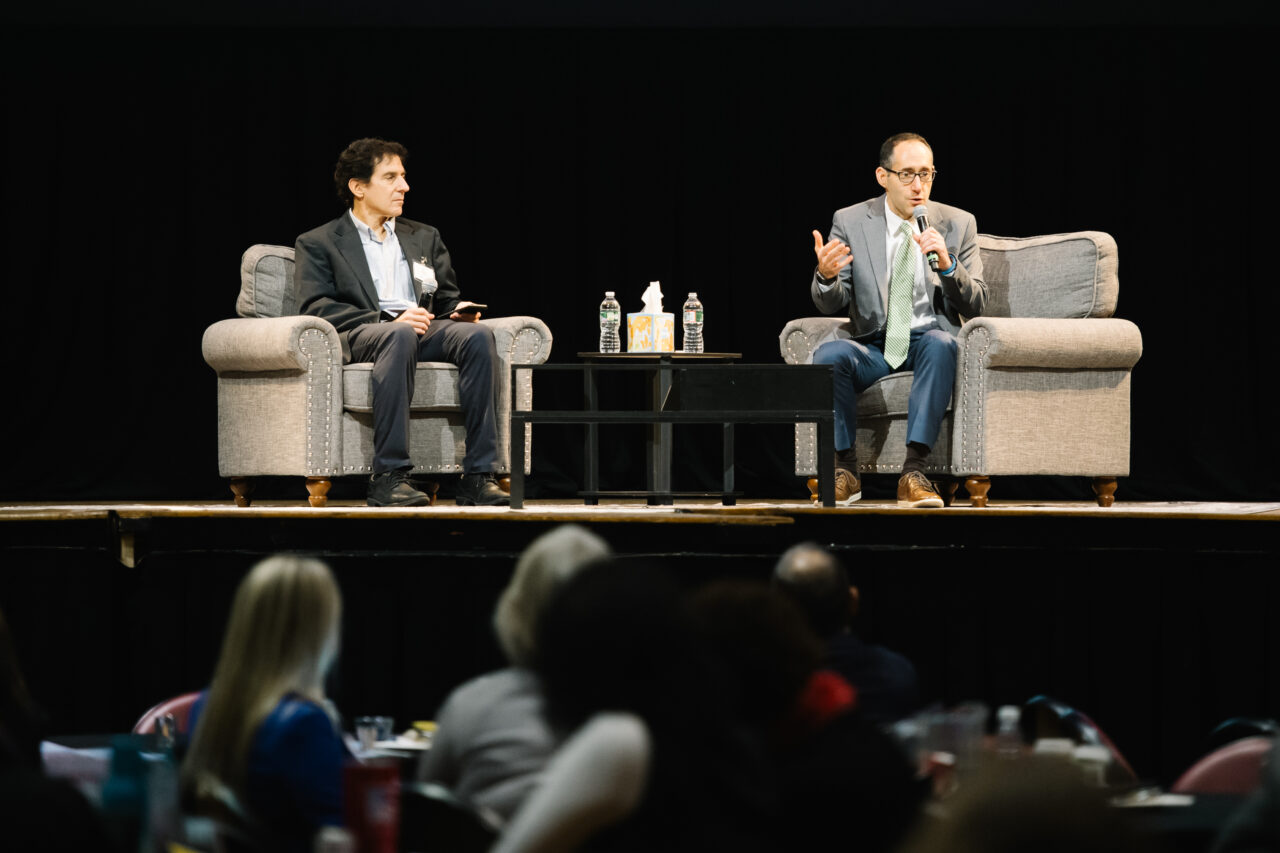
Boston Globe business reporter Jon Chesto led an engaging conversation with Secretary Eric Paley that traced the unconventional path from startup founder to public servant. Paley described his journey from co-founding MIT spinout Brontes Technologies, to investing in high-growth tech firms like PillPack and Formlabs, to unexpectedly answering the call to join state government. What convinced him, he said, was the chance to make an impact at scale. Eight weeks into the role, he spoke with humility and humor about leading a mission-driven team, upgrading the office coffee, and focusing on execution over headlines.
Paley outlined Massachusetts’ economic strategy with focus and optimism, pointing to the DRIVE initiative, a $400 million investment to help universities convert cutting-edge research into jobs, and SHIELD, a new effort to strengthen the state’s $50 billion defense sector. He stressed that growth depends on both innovation and inclusion, saying the Commonwealth must balance Boston’s global economic pull with the opportunity and potential of Gateway Cities. “We don’t have a great economy unless it’s shared across the state,” he noted, calling cities like Lowell and Lynn ideal homes for “tough tech” companies that need space, lower energy costs, and strong community partnerships to grow.
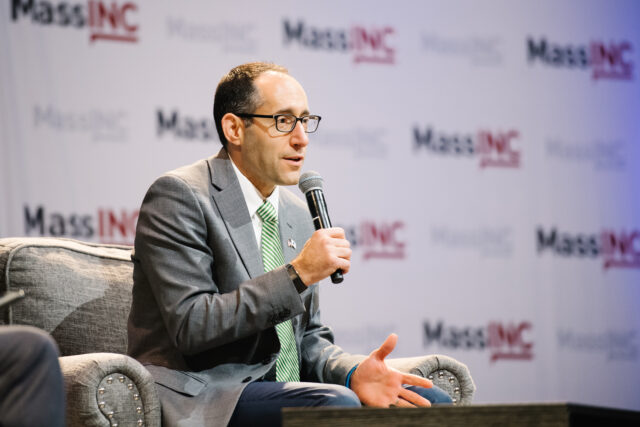
On the future of downtowns, Paley argued that revitalizing main streets is critical for local pride and statewide prosperity. Vacant storefronts, he noted, drain confidence, while vibrant coffee shops and small businesses signal resilience and renewal. Despite fiscal constraints, he affirmed his office’s commitment to supporting these programs. Reflecting on his whirlwind transition, Paley shared that his biggest surprise has been the dedication of his colleagues—people who could work anywhere but choose public service because they care about making a difference. “Impact,” he said, “isn’t theoretical. It’s daily.”
Thank you to all who made this year’s Gateway Cities Innovation Summit a success—our attendees, sponsors, and partners whose energy and ideas power this work year after year. Special thanks to the City of Lowell and the Lowell Memorial Auditorium for their hospitality and partnership in hosting such an inspiring day of discussion and connection. We look forward to seeing everyone next year as MassINC celebrates 30 years of ideas in action, continuing our shared mission to build stronger, more inclusive communities across the Commonwealth.
